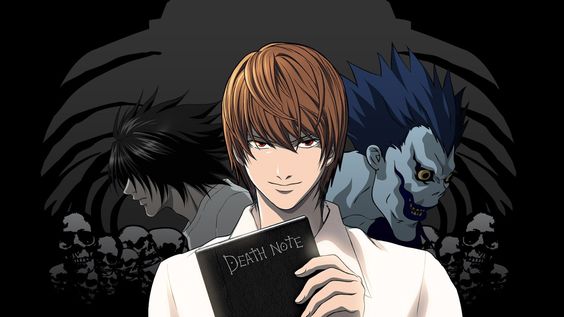
Beyond Good and Evil: Ethical Dilemmas in Death Note
|
|
Temps de lecture 2 min
Écrit par : Ngankoue A Koung
|
|
Temps de lecture 2 min
Death Note, a manga that took Japan by storm from 2003 to 2006, is an intriguing tale of a teenager armed with the powers of a death god, striving to reshape the world order. Despite its shocking premise, it has garnered a massive global fan base. What's even more fascinating is the significant number of fans who support the protagonist, Light, in his mission to eliminate criminals.
Focusing solely on Light in the ethical debate is tempting. The rogue crusader for justice, dubbed Kira by Japan's primetime TV audience, filled an entire graveyard with names written in the ominous Death Note. The enigmatic investigator L, donning the mask of the so-called "good guy," infiltrates the investigation which eventually leads to Kira's undoing. Initially presented as the protagonist, Light's status is short-lived, as L quickly blinds the police force with his proverbial halo.
Even a god of death can't justify Light's actions. Armed with a non-magical pen and a supernatural notebook, he morphs into a serial killer with an alarming body count, targeting not only convicts but anyone he deems deserving of punishment. His list of sins extends to those who might expose his true identity as Kira, adding a layer of conflict to his motives.
In the Death Note universe, let's entertain the notion that society experiences a notable upswing thanks to this self-appointed ninja criminal exterminator. The question then arises: why oppose the progress brought about by a social antibiotic, especially when there's seemingly no collateral damage? Most of Kira's victims meet their demise through heart attacks, devoid of bombs or bullets that indiscriminately harm innocent lives.
Among the hundreds of cases of cardiac arrests, the only fatalities we know of are the intended targets, with a single motorcycle and car crash accounting for these isolated incidents. Despite the potential societal improvements, premeditated murder remains unjustifiable in the fictional world of Death Note.
At the heart of Death Note lies a supernatural notebook that grants its possessor the ability to kill anyone whose name they write in it. Light Yagami, the series' protagonist, stumbles upon this ominous tool and becomes entangled in a complex web of morality. The power bestowed upon him raises fundamental questions about justice, the abuse of power, and the consequences of playing god.
As Light embraces his self-proclaimed role as the god of the new world, viewers confront the blurred line between justice and vengeance. While Light initially seeks to eliminate criminals and create a utopia, his actions gradually transform into a personal quest for power and control. This transformation prompts us to reflect on the dangers of unchecked authority and the seductive nature of absolute power.
Indulging in an unhealthy diet of animal crackers, candy, cake, ice cream, and enough mini fruit jellies to construct another Great Pyramid with the plastic cases, L fuels his hunched frame. His obsession extends beyond personal quirks, masquerading as an ethical dilemma. The perpetually barefoot sugar addict boasts an impeccable track record, having never lost a case and vehemently swearing that he never will. His insecurities prevent him from even tolerating the slightest fragment of the possibility of defeat, especially at the hands of the perpetrator himself.
Death Note serves as a fitting subject to explore the timeless theme of ethical dilemmas. The series challenges us to grapple with complex philosophical concepts, question our moral frameworks, and confront the consequences of wielding absolute power. Death Note challenges us to navigate the murky waters of morality, leaving a lasting impact on viewers well beyond the series' conclusion.
Merci de votre inscription
Cet e-mail a été enregistré !